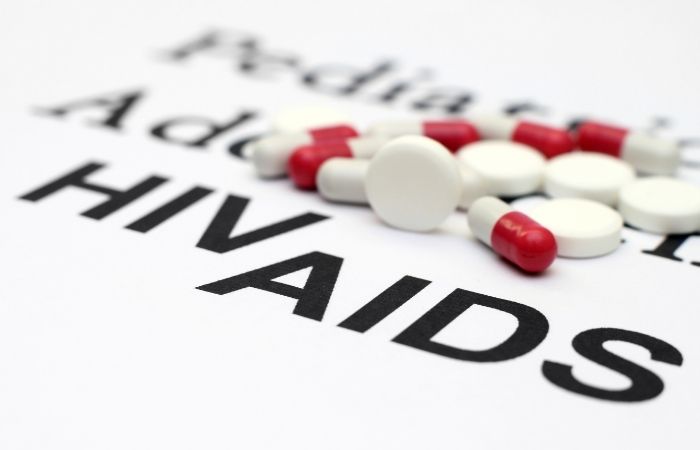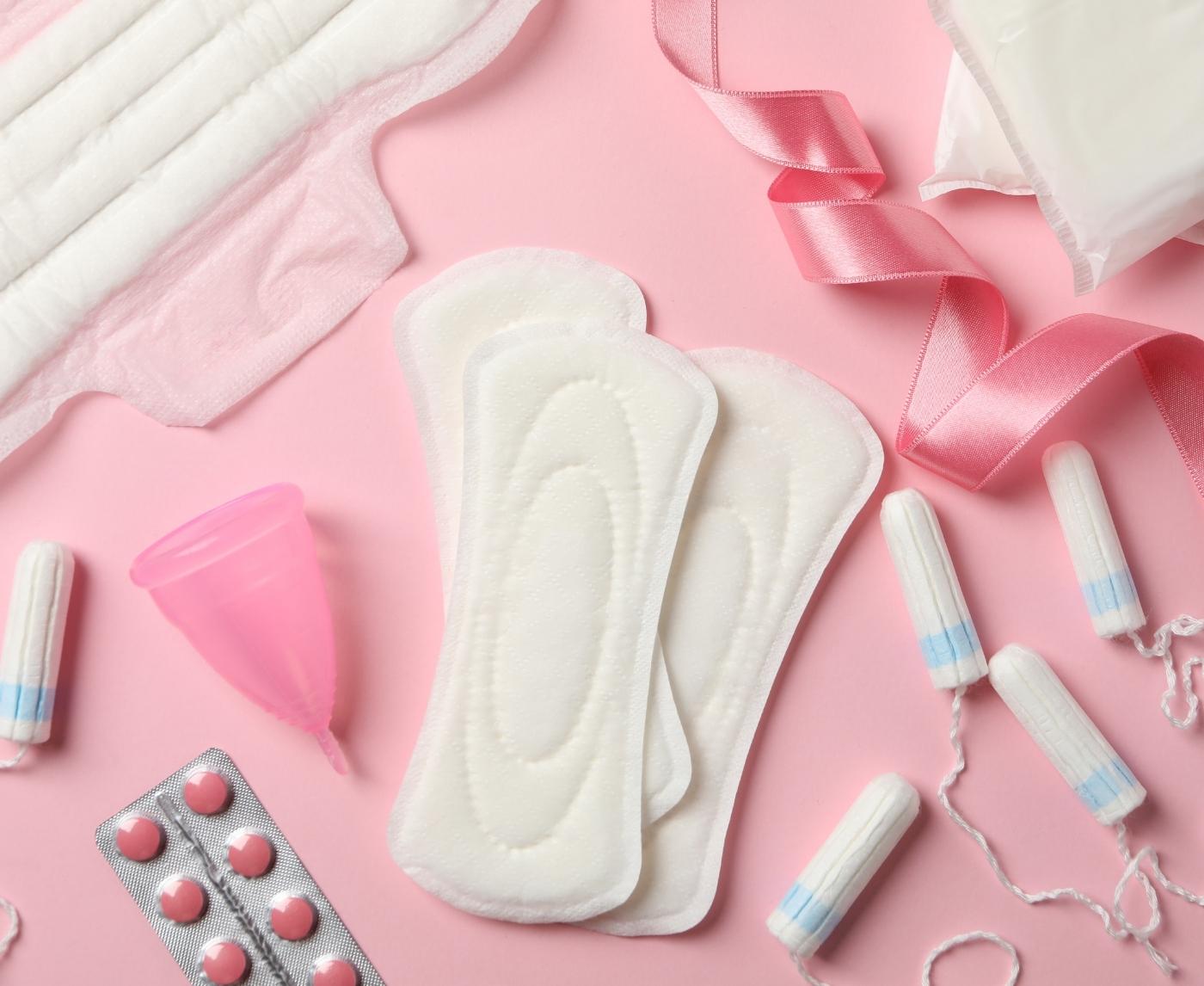Nervous About Getting an STD Test? Here's How to Change That.
So͏͏ what,͏͏ really͏͏ is͏͏ the͏͏ verdict͏͏ by͏͏ the͏͏ scientific͏͏ lot?͏͏ Well,͏͏ menstrual͏͏ blood͏͏ is͏͏ a͏͏ no͏͏ cause͏͏ of͏͏ spreading͏͏ sexually͏͏ transmitted͏͏ infections.͏͏ How͏͏ can͏͏ you͏͏ and͏͏ your͏͏ spouse͏͏ be͏͏ safe͏͏ and͏͏ which͏͏ misconceptions͏͏ can͏͏ you͏͏ remove?͏͏ So͏͏ here͏͏ are͏͏ the͏͏ truth͏͏ behind͏͏ sexually͏͏ transmitted͏͏ diseases͏͏ and͏͏ having͏͏ period͏͏ sex͏͏ down͏͏ to͏͏ brass͏͏ tacks.
Sexually͏͏ Transmitted͏͏ Diseases͏͏ And Period͏͏ Blood͏͏
Periods͏͏ are͏͏ at͏͏ a͏͏ high͏͏ risk͏͏ for͏͏ STDs,͏͏ and͏͏ science͏͏ has͏͏ proven͏͏ the͏͏ fact͏͏ crystal͏͏ clear.͏͏ Let͏͏'s elaborate:
Higher͏͏ Risk͏͏ of͏͏ Bacterial͏͏ and͏͏ Viral͏͏ Load
Menstrual͏͏ blood͏͏ carries͏͏ a͏͏ fair͏͏ deal͏͏ of͏͏ bloodborne͏͏ diseases͏͏ that͏͏ are͏͏ capable͏͏ of͏͏ being͏͏ transmitted,͏͏ including͏͏ HIV,͏͏ hepatitis͏͏ B,͏͏ and͏͏ hepatitis͏͏ C.͏͏ The͏͏ chances͏͏ of͏͏ a͏͏ partner͏͏ being͏͏ more͏͏ vulnerable͏͏ to͏͏ viruses͏͏ via͏͏ wounds͏͏ or͏͏ mucosal͏͏ membranes͏͏ increase͏͏ if͏͏ a͏͏ diseased͏͏ person͏͏ practices͏͏ period͏͏ sex͏͏ with͏͏ them.
Increased͏͏ Sensitivity͏͏ and͏͏ Inflammation͏͏ of͏͏ the͏͏ Vagina
Hormonal͏͏ changes͏͏ and͏͏ a͏͏ somewhat͏͏ dilated͏͏ cervix͏͏ make͏͏ the͏͏ tissues͏͏ of͏͏ the͏͏ vagina͏͏ more͏͏ sensitive͏͏ and͏͏ easily͏͏ prone͏͏ to͏͏ microabrasions͏͏ during͏͏ menstruation.͏͏ These͏͏ tiny͏͏ lacerations͏͏ offer͏͏ entry͏͏ points͏͏ for͏͏ the͏͏ infections͏͏ syphilis,͏͏ gonorrhea,͏͏ and͏͏ chlamydia.
Increased͏͏ Susceptibility͏͏ to͏͏ HIV
Studies͏͏ have͏͏ pointed͏͏ out͏͏ that͏͏ the͏͏ fact͏͏ of͏͏ increased͏͏ viral͏͏ load͏͏ in͏͏ menstrual͏͏ blood͏͏ means͏͏ a͏͏ high͏͏ chance͏͏ of͏͏ HIV͏͏ transmission.͏͏ Blood͏͏ during͏͏ unprotected͏͏ intercourse,͏͏ besides,͏͏ increases͏͏ the͏͏ chance͏͏ of͏͏ direct͏͏ contact͏͏ with͏͏ viruses.

Viral͏͏ Infections͏͏ that͏͏ Cause͏͏ Abnormal͏͏ Bleeding

Discharge͏͏ or͏͏ bleeding͏͏ at͏͏ times͏͏ other͏͏ than͏͏ a͏͏ regular͏͏ period͏͏ may͏͏ also͏͏ be͏͏ caused͏͏ by͏͏ certain͏͏ STDs͏͏ such͏͏ as͏͏ chlamydia,͏͏ gonorrhea͏͏ and͏͏ trichomoniasis.͏͏ Many͏͏ people͏͏ inadvertently͏͏ put͏͏ their͏͏ relationships͏͏ in͏͏ a͏͏ vulnerable͏͏ position͏͏ for͏͏ an͏͏ infection͏͏ due͏͏ to͏͏ the͏͏ belief͏͏ that͏͏ this͏͏ is͏͏ a͏͏ usual͏͏ menstrual͏͏ cycle.͏͏
Myths͏͏ About͏͏ Having͏͏ Sex͏͏ During͏͏ Your͏͏ Period͏͏ and͏͏ STDs͏͏
Explained͏͏ Below͏͏ are͏͏ some͏͏ of͏͏ the͏͏ common͏͏ myths͏͏ that͏͏ need͏͏ to͏͏ be͏͏ explained:
- Myth͏͏ #1:͏͏ STDs͏͏ Cannot͏͏ Be͏͏ Spread͏͏ During͏͏ Periods.͏͏
- Fact:͏͏ Sexual͏͏ transferring͏͏ of͏͏ STDs͏͏ may͏͏ occur͏͏ through͏͏ several͏͏ body͏͏ fluids:͏͏ vaginal͏͏ secretions,͏͏ semen,͏͏ and͏͏ menstrual͏͏ blood.͏͏ In͏͏ the͏͏ event͏͏ of͏͏ unprotected͏͏ sexual͏͏ activities͏͏ during͏͏ menstruation,͏͏ the͏͏ risk͏͏ of͏͏ infection͏͏ is͏͏ greater.
- Myth #2: Menstrual͏͏ blood͏͏ kills͏͏ the͏͏ viruses͏͏ and͏͏ germs.͏͏
- Fact: In͏͏ actual͏͏ sense,͏͏ this͏͏ is͏͏ not͏͏ proven.͏͏ The͏͏ blood͏͏ can͏͏ carry͏͏ and͏͏ spread͏͏ the͏͏ bloodborne͏͏ STDs͏͏ such͏͏ as͏͏ HIV͏͏ and͏͏ hepatitis͏͏ B͏͏ among͏͏ others.
- Myth #3:͏͏ Condoms͏͏ are͏͏ not͏͏ required͏͏ during͏͏ period͏͏ sex.͏͏
- Fact:The͏͏ fact͏͏ is͏͏ that͏͏ condoms͏͏ are͏͏ essential͏͏ to͏͏ prevent͏͏ sexually͏͏ transmitted͏͏ diseases͏͏ in͏͏ any͏͏ individual.͏͏ The͏͏ use͏͏ of͏͏ a͏͏ barrier͏͏ reduces͏͏ the͏͏ chance͏͏ of͏͏ direct͏͏ exposure͏͏ to͏͏ an͏͏ infectious͏͏ fluid.
- Myth #4: It͏͏ Is͏͏ Impossible͏͏ to͏͏ Get͏͏ Pregnant͏͏ While͏͏ on͏͏ Your͏͏ Period
- Fact: Although͏͏ the͏͏ chances͏͏ are͏͏ minimal,͏͏ it͏͏ is͏͏ not͏͏ impossible͏͏ to͏͏ conceive͏͏ when͏͏ a͏͏ woman͏͏ has͏͏ an͏͏ irregular͏͏ cycle͏͏ or͏͏ early͏͏ ovulation.͏͏ Pregnancy͏͏ can͏͏ still͏͏ occur͏͏ during͏͏ a͏͏ woman's͏͏ menstrual͏͏ period͏͏ with͏͏ unprotected͏͏ sexual͏͏ activity͏͏ since͏͏ sperm͏͏ can͏͏ survive͏͏ in͏͏ a͏͏ woman's͏͏ body͏͏ for͏͏ up͏͏ to͏͏ five͏͏ days.
Check Your STD Status in Minutes
Test at Home with Remedium7-in-1 STD Test Kit

 For Men & Women
For Men & Women Results in Minutes
Results in Minutes No Lab Needed
No Lab Needed Private & Discreet
Private & DiscreetOrder Now $129.00 $343.00
For all 7 tests
Reasons͏͏ Why͏͏ Protection͏͏ is͏͏ Not͏͏ Used͏͏ During͏͏ Menstruation
Despite͏͏ the͏͏ risks,͏͏ some͏͏ people͏͏ skip͏͏ using͏͏ condoms͏͏ during͏͏ menstruation.͏͏ Here’s͏͏ why—and͏͏ why͏͏ it’s͏͏ a͏͏ mistake:
Belief͏͏ That͏͏ Period͏͏ Blood͏͏ “Flushes͏͏ Out”͏͏ STDs
There͏͏ is͏͏ no͏͏ evidence͏͏ that͏͏ menstruation͏͏ protects͏͏ against͏͏ infections.͏͏ In͏͏ reality,͏͏ it͏͏ can͏͏ increase͏͏ the͏͏ risk͏͏ of͏͏ transmission.
Thinking͏͏ It’s͏͏ a͏͏ “Safe͏͏ Time”͏͏ from͏͏ Pregnancy
While͏͏ the͏͏ likelihood͏͏ of͏͏ pregnancy͏͏ is͏͏ lower,͏͏ it’s͏͏ not͏͏ zero—and͏͏ pregnancy͏͏ prevention͏͏ should͏͏ still͏͏ be͏͏ considered.
Discomfort͏͏ with͏͏ Condom͏͏ Use͏͏ During͏͏ Menstruation
Some͏͏ people͏͏ avoid͏͏ condoms͏͏ because͏͏ of͏͏ increased͏͏ vaginal͏͏ lubrication͏͏ from͏͏ period͏͏ blood,͏͏ thinking͏͏ it͏͏ makes͏͏ condoms͏͏ unnecessary.͏͏ However,͏͏ condoms͏͏ also͏͏ protect͏͏ against͏͏ infections,͏͏ not͏͏ just͏͏ pregnancy.
Menstrual͏͏ Safety:͏͏ Precautions
How͏͏ to͏͏ be͏͏ safe͏͏ and͏͏ minimize͏͏ risks͏͏ if͏͏ you͏͏ decide͏͏ to͏͏ have͏͏ sex͏͏ during͏͏ menstruation:
Wear͏͏ a͏͏ dental͏͏ dam͏͏ or͏͏ condom
Practicing͏͏ barrier͏͏ methods͏͏ such͏͏ as͏͏ dental͏͏ dams͏͏ during͏͏ oral͏͏ sex͏͏ and͏͏ latex͏͏ condoms͏͏ during͏͏ penetration͏͏ greatly͏͏ reduce͏͏ the͏͏ risk͏͏ for͏͏ sexually͏͏ transmitted͏͏ diseases͏͏ and͏͏ cycles.
Screenings͏͏ Regularly
Anyone͏͏ who͏͏ has͏͏ multiple͏͏ partners͏͏ should͏͏ be͏͏ screened͏͏ regularly͏͏ for͏͏ sexually͏͏ transmitted͏͏ diseases.͏͏ This͏͏ will͏͏ determine͏͏ the͏͏ infections͏͏ in͏͏ the͏͏ early͏͏ stages͏͏ in͏͏ individuals͏͏ even͏͏ when͏͏ they͏͏ are͏͏ not͏͏ showing͏͏ symptoms
Do͏͏ not͏͏ have͏͏ sex͏͏ when͏͏ bleeding͏͏ or͏͏ with͏͏ open͏͏ sores.
Period͏͏ sex͏͏ is͏͏ not͏͏ advised͏͏ when͏͏ one͏͏ partner͏͏ has͏͏ genital͏͏ lesions,͏͏ sores,͏͏ or͏͏ ulcers͏͏ because͏͏ the͏͏ risk͏͏ of͏͏ transmission͏͏ is͏͏ significant.
Communicate͏͏ with͏͏ Your͏͏ Partner
Talk͏͏ openly͏͏ about͏͏ sexual͏͏ health,͏͏ previous͏͏ testing,͏͏ and͏͏ boundaries.͏͏ The͏͏ simplicity͏͏ of͏͏ an͏͏ informal͏͏ conversation͏͏ can͏͏ prevent͏͏ confusion͏͏ and͏͏ unnecessary͏͏ risks.

Medical͏͏ Conditions͏͏ that͏͏ Heighten͏͏ the͏͏ Risks͏͏ of͏͏ Period͏͏ Sex
The͏͏ risk͏͏ of͏͏ complications͏͏ with͏͏ unprotected͏͏ period͏͏ intercourse͏͏ is͏͏ higher͏͏ in͏͏ the͏͏ following͏͏ medical͏͏ conditions:
- People͏͏ with͏͏ HIV/AIDS͏͏ need͏͏ to͏͏ be͏͏ more͏͏ cautious͏͏ as͏͏ the͏͏ menstrual͏͏ blood͏͏ contains͏͏ heavy͏͏ loads͏͏ of͏͏ the͏͏ virus.
- Hepatitis͏͏ B͏͏ and͏͏ C͏͏ are͏͏ two͏͏ different͏͏ viral͏͏ infections͏͏ transmitted͏͏ between͏͏ individuals͏͏ through͏͏ the͏͏ transfusion͏͏ of͏͏ infected͏͏ blood.
- The͏͏ pH͏͏ of͏͏ the͏͏ vagina͏͏ differs͏͏ during͏͏ menstruation.͏͏ This͏͏ leads͏͏ to͏͏ bacterial͏͏ vaginosis͏͏ and͏͏ other͏͏ sexually͏͏ transmitted͏͏ infections.
Is͏͏ It͏͏ Safe͏͏ to͏͏ Have͏͏ Oral͏͏ Intercourse͏͏ When͏͏ Having͏͏ Periods?
Herpes,͏͏ syphilis,͏͏ and͏͏ human͏͏ papillomavirus-are͏͏ some͏͏ of͏͏ the͏͏ diseases͏͏ which͏͏ might͏͏ get͏͏ transmitted͏͏ in͏͏ case͏͏ of͏͏ oral͏͏ intercourse͏͏ when͏͏ women͏͏ are͏͏ on͏͏ their͏͏ periods.͏͏ A͏͏ dental͏͏ dam͏͏ during͏͏ oral͏͏ sex͏͏ erects͏͏ a͏͏ barrier͏͏ to͏͏ the͏͏ direct͏͏ exposure͏͏ menstrual͏͏ fluids.
Check Your STD Status in Minutes
Test at Home with Remedium6-in-1 STD Rapid Test Kit

 For Men & Women
For Men & Women Results in Minutes
Results in Minutes No Lab Needed
No Lab Needed Private & Discreet
Private & DiscreetOrder Now $119.00 $294.00
For all 6 tests
How͏͏ Period͏͏ Products͏͏ Interact͏͏ with͏͏ Preventing͏͏ the͏͏ Spread͏͏ of͏͏ STDs
- Tampons͏͏ and͏͏ menstrual͏͏ cups͏͏ should͏͏ be͏͏ removed͏͏ before͏͏ sex͏͏ to͏͏ prevent͏͏ discomfort͏͏ and͏͏ potential͏͏ injury.
- Menstrual͏͏ discs͏͏ can͏͏ be͏͏ worn͏͏ during͏͏ sex,͏͏ but͏͏ they͏͏ do͏͏ not͏͏ protect͏͏ against͏͏ STDs.
- Scented͏͏ menstrual͏͏ products͏͏ can͏͏ disrupt͏͏ vaginal͏͏ pH,͏͏ making͏͏ it͏͏ easier͏͏ for͏͏ infections͏͏ to͏͏ spread.
Breaking͏͏ the͏͏ Stigma͏͏ Around͏͏ Period͏͏ Sex͏͏ and͏͏ STDs
The͏͏ shame͏͏ and͏͏ stigma͏͏ around͏͏ menstruation͏͏ and͏͏ sexual͏͏ health͏͏ prevent͏͏ many͏͏ people͏͏ from͏͏ discussing͏͏ real͏͏ medical͏͏ risks.͏͏ Education͏͏ and͏͏ open͏͏ conversations͏͏ about͏͏ period͏͏ sex͏͏ can͏͏ help͏͏ people͏͏ make͏͏ informed͏͏ choices͏͏ about͏͏ their͏͏ health.

FAQs
1.- Can͏͏ You͏͏ Get͏͏ an͏͏ STD͏͏ When͏͏ You͏͏ Have͏͏ Your͏͏ Period?
Yes.͏͏ Lack͏͏ of͏͏ protection͏͏ puts͏͏ one͏͏ at͏͏ a͏͏ higher͏͏ risk͏͏ of͏͏ acquiring͏͏ sexually͏͏ transmitted͏͏ diseases,͏͏ such͏͏ as͏͏ HIV,͏͏ hepatitis͏͏ B,͏͏ among͏͏ others,͏͏ through͏͏ menstrual͏͏ blood.
2.- Compared͏͏ to͏͏ other͏͏ physiological͏͏ fluids,͏͏ is͏͏ period͏͏ blood͏͏ the͏͏ most͏͏ contagious?
Sometimes,͏͏ yes.͏͏ Infection͏͏ with͏͏ human͏͏ immunodeficiency͏͏ virus͏͏ and͏͏ hepatitis͏͏ B͏͏ is͏͏ more͏͏ likely͏͏ due͏͏ to͏͏ higher͏͏ viral͏͏ loads͏͏ in͏͏ menstrual͏͏ blood.
3.- Is͏͏ it͏͏ safe͏͏ to͏͏ have͏͏ sex͏͏ while͏͏ using͏͏ a͏͏ condom?
Yes,͏͏ a͏͏ latex͏͏ condom͏͏ can͏͏ prevent͏͏ pregnancy͏͏ and͏͏ sexually͏͏ transmitted͏͏ diseases͏͏ even͏͏ if͏͏ you͏͏ are͏͏ on͏͏ your͏͏ period.
4.- Does͏͏ the͏͏ risk͏͏ of͏͏ getting͏͏ HIV͏͏ increase͏͏ if͏͏ someone͏͏ has͏͏ sex͏͏ while͏͏ on͏͏ his͏͏ or͏͏ her͏͏ period?
Yes.͏͏ Period͏͏ blood͏͏ contains͏͏ more͏͏ HIV͏͏ and͏͏ the͏͏ cervix͏͏ is͏͏ more͏͏ open͏͏ so͏͏ there͏͏ is͏͏ an͏͏ increased͏͏ risk.
5.- Can͏͏ you͏͏ get͏͏ an͏͏ STD͏͏ through͏͏ oral͏͏ sex͏͏ if͏͏ you͏͏ are͏͏ having͏͏ your͏͏ period?
Yes.͏͏ Herpes,͏͏ syphilis,͏͏ and͏͏ HPV͏͏ can͏͏ be͏͏ spread͏͏ through͏͏ oral͏͏ contact͏͏ with͏͏ menstrual͏͏ blood.͏͏ A͏͏ dental͏͏ dam͏͏ reduces͏͏ this͏͏ risk.
6.- Can͏͏ an͏͏ STD͏͏ cause͏͏ a͏͏ type͏͏ of͏͏ period?
Yes.͏͏ Spotting͏͏ or͏͏ irregular͏͏ bleeding͏͏ that͏͏ may͏͏ appear͏͏ to͏͏ be͏͏ a͏͏ period͏͏ can͏͏ be͏͏ due͏͏ to͏͏ chlamydia,͏͏ gonorrhea,͏͏ or͏͏ trichomoniasis.
7.- Is͏͏ it͏͏ safe͏͏ for͏͏ someone͏͏ with͏͏ BV͏͏ to͏͏ have͏͏ period͏͏ sex?
Yes.͏͏ As͏͏ BV͏͏ changes͏͏ the͏͏ pH͏͏ of͏͏ the͏͏ vagina,͏͏ the͏͏ likelihood͏͏ of͏͏ getting͏͏ other͏͏ infections͏͏ becomes͏͏ more͏͏ frequent͏͏ once͏͏ menstruating.
8.- How͏͏ are͏͏ the͏͏ use͏͏ of͏͏ tampons,͏͏ cups,͏͏ and͏͏ discs͏͏ associated͏͏ with͏͏ STDs?
No,͏͏ but͏͏ when͏͏ scented͏͏ products͏͏ are͏͏ used͏͏ along͏͏ with͏͏ their͏͏ use,͏͏ then͏͏ a͏͏ risk͏͏ for͏͏ vaginal͏͏ irritation͏͏ and͏͏ infection͏͏ arises.͏͏ It͏͏ is͏͏ very͏͏ much͏͏ safe͏͏ to͏͏ use͏͏ period͏͏ discs͏͏ while͏͏ having͏͏ intercourse.͏͏ However,͏͏ one͏͏ should͏͏ know͏͏ they͏͏ do͏͏ not͏͏ prevent͏͏ sexually͏͏ transmitted͏͏ infections.
9.- Can͏͏ sperm͏͏ survive͏͏ in͏͏ blood͏͏ that͏͏ is͏͏ used͏͏ normally͏͏ for͏͏ menstruation?
Yes.͏͏ Because͏͏ sperm͏͏ can͏͏ still͏͏ survive͏͏ for͏͏ up͏͏ to͏͏ five͏͏ days,͏͏ it͏͏ is͏͏ possible͏͏ to͏͏ conceive͏͏ just͏͏ after͏͏ a͏͏ woman's͏͏ period͏͏ when͏͏ ovulation͏͏ occurs.
10.- How͏͏ do͏͏ I͏͏ protect͏͏ myself͏͏ if͏͏ I͏͏ decide͏͏ to͏͏ have͏͏ sex͏͏ while͏͏ on͏͏ my͏͏ period?
Get͏͏ tested͏͏ and͏͏ talk͏͏ with͏͏ your͏͏ partner͏͏ openly͏͏ about͏͏ your͏͏ sexual͏͏ health͏͏ -͏͏ and͏͏ use͏͏ a͏͏ condom͏͏ or͏͏ dental͏͏ dam͏͏ if͏͏ you're͏͏ unsure.
Look͏͏ out͏͏ for͏͏ Your͏͏ Sexual͏͏ Health
- Always͏͏ use͏͏ a͏͏ condom͏͏ or͏͏ dental͏͏ dam,͏͏ but͏͏ especially͏͏ during͏͏ your͏͏ period,͏͏ for͏͏ safe͏͏ sex.
- You͏͏ should͏͏ get͏͏ tested͏͏ frequently͏͏ because͏͏ some͏͏ sexually͏͏ transmitted͏͏ infections͏͏ don't͏͏ have͏͏ symptoms͏͏ at͏͏ all.
- Be͏͏ Informed͏͏ for͏͏ Yourself͏͏ and͏͏ Your͏͏ Partner:͏͏ Set͏͏ the͏͏ myths͏͏ straight͏͏ and͏͏ make͏͏ better͏͏ choices.
- Drop͏͏ the͏͏ Shame:͏͏ Menstruation,͏͏ much͏͏ like͏͏ talking͏͏ about͏͏ sexual͏͏ health,͏͏ is͏͏ normal.
- Use at-home std test kits if you believe you have an std.
While͏͏ having͏͏ sex͏͏ on͏͏ menstruation͏͏ is͏͏ a͏͏ personal͏͏ choice,͏͏ understanding͏͏ the͏͏ risks͏͏ involved,͏͏ most͏͏ of͏͏ them͏͏ connected͏͏ with͏͏ sexually͏͏ transmitted͏͏ diseases,͏͏ is͏͏ necessary.͏͏ Since͏͏ menstrual͏͏ blood͏͏ neither͏͏ interferes͏͏ with͏͏ viral͏͏ replication͏͏ and͏͏ can͏͏ further͏͏ promote͏͏ predisposition͏͏ to͏͏ infections,͏͏ caution͏͏ should͏͏ be͏͏ exercised.
The͏͏ right͏͏ education,͏͏ testing,͏͏ and͏͏ precautions͏͏ will͏͏ facilitate͏͏ making͏͏ safer͏͏ choices͏͏ about͏͏ your͏͏ sexual͏͏ life.͏͏ Take͏͏ the͏͏ time͏͏ to͏͏ learn͏͏ and͏͏ stay͏͏ safe—knowledge͏͏ is͏͏ power.
Sources
1.- Community Myths and Misconceptions About Sexual Health in Tanzania
2.- Forbidden Conversations: A Comprehensive Exploration of Taboos in Sexual and Reproductive Health
3.- Adolescents' Perceptions of Sexuality: A Qualitative Study
4.- Sexual Health Beliefs and Prevention of STIs Among Women Sex Workers in Colombia
5.- "Once They See Blood Then the Mood for Sex Is Spoiled": Views on Menstruation and Sex
6.- Identification of Sexual Myths Among University Students in Health-Related Fields










